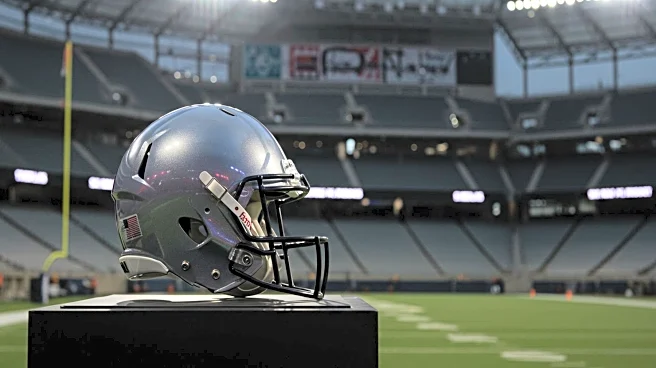What's Happening?
Notre Dame has concluded its quarterback competition by naming redshirt freshman CJ Carr as the starter for Week 1 against Miami. Head coach Marcus Freeman made the decision after Carr outperformed redshirt sophomore Kenny Minchey and redshirt junior Steve Angeli, who transferred to Syracuse. Carr, a traditional pocket passer, committed to Notre Dame over several other top programs and is considered a key player for the team's future. Despite an elbow injury limiting his play last season, Carr has demonstrated strong passing skills and pocket presence in practice, earning him the starting role.
Why It's Important?
The decision to start CJ Carr is significant for Notre Dame as it sets the tone for the team's offensive strategy this season. Carr's ability to extend plays and his accuracy in passing could enhance Notre Dame's competitiveness in upcoming games. This move also reflects Freeman's confidence in Carr's potential to lead the team, despite his limited college-level experience. The choice of Carr over Minchey, who is noted for his running ability, suggests a focus on a more traditional passing game, which could impact the team's overall performance and strategy.
What's Next?
CJ Carr will make his debut as Notre Dame's starting quarterback on August 31 against Miami at Hard Rock Stadium. This game will be broadcast nationally on ABC, providing Carr with a high-profile platform to showcase his skills. The team's performance in this game could influence Freeman's future decisions regarding the quarterback position and offensive strategy. Observers will be watching closely to see how Carr handles the pressure and whether he can deliver on the expectations set by his coaches and fans.
Beyond the Headlines
Carr's appointment as starting quarterback may influence recruiting dynamics, as his success could attract more high-caliber players to Notre Dame. Additionally, his performance could impact the team's standing in national rankings and its prospects for postseason play. The decision also highlights the evolving nature of college football, where young talent is increasingly prioritized, potentially shifting traditional approaches to player development and team leadership.









